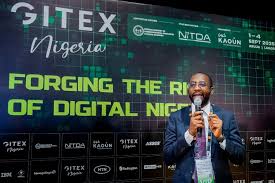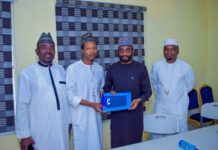The Question That Took Me to GITEX Nigeria
By Arafat A. Abdulrazaq,
When I stepped into the conference hall of the Abuja Continental Hotel, last week, for GITEX Africa’s debut in Nigeria, I was not there out of idle curiosity. I did not come for tote bags or name tags.
I came with a question that has troubled me for months: will artificial intelligence create jobs for young Nigerians, or will it take them away? For my generation, this is not a theoretical musing.
We have watched AI quietly automate customer service, legal reviews, even the writing of computer code. Nigeria holds one of the largest youth populations in the world, yet if we remain mere consumers of foreign-built AI tools, jobs could vanish faster than they are created.
But if we become producers and early adopters, we could generate entirely new industries. This was why GITEX Nigeria mattered. The same organizers behind GITEX Global — the largest tech gathering across Africa and the Middle East — brought its first Nigerian edition.
Abuja hosted the Government Leadership & AI Summit from September 1–2, 2025, followed by Lagos hosting the Tech Expo and Startup Festival from September 3–4. Ministers, governors, World Bank officials, and tech executives gathered under one roof.
The theme — “Government Leadership and the AI Summit” — was not abstract. It was urgent. Some critics argue Nigeria should fix electricity and roads before chasing artificial intelligence. That is fair, yet also short-sighted.
The AI revolution is unfolding whether we are ready or not, and it allows simultaneous building of infrastructure, regulation, and prototypes. Waiting is the surest path to irrelevance.
Speaking at the event, Trixie LohMirmand, CEO of KAOUN International, put it in stark terms: “We want Nigeria not to be an outlier. We want Nigeria to have a third seat at the global table in the new digital AI economy.” Her words lingered with me.
In this new age, you are either seated at the table, or you are on the menu. Nigeria’s place is still undecided. Mallam Kashifu Inuwa Abdullahi, Director-General of NITDA, on his part, reminded us that Nigeria has “no excuse” to stay behind.
Our population of over 232 million, with its diversity and expanding digital footprint, offers a massive data advantage. “AI is not just about technology,” he insisted. “It is about people, opportunity, and sovereignty.”
The sessions painted vivid possibilities. In Lagos, an AI tool now scans X-rays within seconds, helping doctors detect pneumonia and saving children’s lives in crowded hospitals. In Kaduna, an AI-powered app predicts rainfall, guiding farmers to plant at the right time and reduce losses.
Yet, the discussions also exposed the gaps. “Skills without use cases is a waste,” one panelist warned. Nigeria graduates thousands of engineers and computer scientists, but with limited industries to absorb them, many drift into unrelated jobs or leave the country altogether.
And then there was the hard truth about computing power. AI runs on GPUs — chips largely made in Taiwan and hoarded in the tug-of-war between China and the United States. Without access, Nigeria cannot train models at scale.
Enter Dr. Bosun Tijani, Minister of Communications, Innovation & Digital Economy, who reframed the problem: “We are not disadvantaged because we lack chips, but because we lack access to the geopolitics behind them.”
His words struck me deeply. Nigeria is racing not just against time, but against global superpowers. I left GITEX Nigeria with no final answers, but with clarity. Our beloved nation is right to prioritize data centers. Chips may be far, but securing our data is non-negotiable.
It is how we preserve our languages, cultures, and realities in the datasets that will define tomorrow’s machines. Without sovereignty over our data, we risk a future where artificial intelligence speaks Silicon Valley slang fluently but struggles with Yoruba, Hausa, or Igbo.
There are also untapped opportunities. Imagine Nigerians pooling unused computing power into swarm networks — a decentralized AI infrastructure. It will not rival Nvidia overnight, but it could harness our collective strength while the world scrambles for GPUs.
The World Bank’s Matthew Verghis explained how blended financing models — grants, public-private partnerships, derisked investments — could support AI adoption. Cape Verde’s Pedro Lopes warned against working in silos, insisting AI must be treated as infrastructure.
That was the heart of it all: artificial intelligence is not a sector. It is the new electricity. A nation that lags risks becoming an economic colony of those who lead. Whoever controls AI infrastructure will control data pipelines, national security, and even cultural memory.
By the time the GITEX event, I was convinced of two things. Nigeria has the talent, ambition, and raw data. But without urgency, vision, and political will, these strengths mean little.
The resolution from GITEX Nigeria should be clear and uncompromising: treat AI as critical infrastructure. In practice, this means commissioning sovereign data centers and public cloud tenancy for government services, launching a national AI Use Cases Program that deploys corps members for training across agriculture, health, and logistics, and establishing a blended-finance AI Fund to support computing power and startups.
These are not dreams. They are steps we can take within 12 to 18 months. The question I carried into GITEX Nigeria still echoes: will artificial intelligence create jobs for us, or take them away?
The answer depends entirely on what Great Fatherland chooses to do in the next few years.
As-Sayyidul Arafat Abdulrazaq is a corps member serving with the Centre for Crisis Communication (CCC), Abuja. He can be reached via: [email protected].















